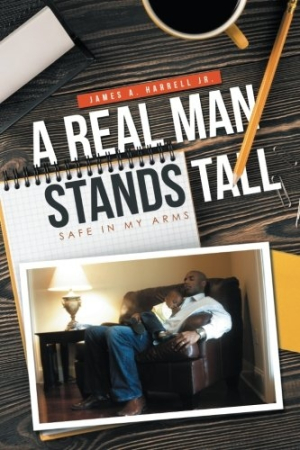A Real Man Stands Tall
Safe in My Arms
Real-life experience and wisdom result in pertinent advice on fatherhood and what it means to be a family man.
In his collage-like collection of writing, James Harrell Jr. addresses the hole left in his childhood by an absent father. As an articulate response to that emotional gap, A Real Man Stands Tall offers candid and affecting lessons on fatherhood and personal responsibility.
Harrell was raised by his mother in New Orleans. His father not only failed to play an active role in his life but even failed to pay child support. The book explores the psychological and emotional damage of this estrangement. Written from a Christian perspective, the book incorporates scriptural teachings as well as inspirational quotes from public figures into its many narratives as Harrell attempts to reconcile with his father and become a moral authority figure to his own children. Cleverly divided into the four seasons of winter, spring, summer, and fall, the book includes interviews with leaders of the author’s religious community, stories, essays, poems, and personal letters.
Though fresh and innovative in approach, this eclectic sourcing becomes problematic. Some entries lack attribution. For instance, letters near the end of the book describe, rather powerfully, a man’s experiences with crime, prison, and infidelity. But the letters are either unsigned or signed by epithets like “A New Creature,” and it’s unclear if they are fictional or autobiographical. This confusion obscures the otherwise potent message the author imparts in passages clearly attributed to himself.
The book also walks a fine line between praising mothers—and the teamwork needed to raise a family—and defining gender roles in traditional patriarchal terms. A few passages argue that single mothers are, by essence of their gender, unable to fill the role of male authority figures.
In contrast, the book’s best section relies on poetry. Poems range from religious devotionals to heartfelt odes on the poet’s son. In “A Father’s Advice,” the lovely refrain “Stand tall my son, like a redwood tree” begins each stanza, punctuating the speaker’s encouraging words. In the haunting “Who Will Fend for Michael?” three-line stanzas crescendo nicely into a religious message on personal responsibility.
Also noteworthy are the author’s interviews with the children of the Rev. Daniel Muse. Coming after an interview with the reverend himself, the interviews interweave similar yet nuanced perspectives on the father figure. This layered technique illuminates the dynamic relationship between a father and his children and demonstrates how a positive role model in the home has long-lasting effects on children’s lives.
Grounded in Christian morality, A Real Man Stands Tall will certainly appeal to readers of the same faith. But the book brings enough real-life experience and wisdom to the table to offer nonbelievers pertinent advice on fatherhood and what it means to be a family man.
Reviewed by
Scott Neuffer
Disclosure: This article is not an endorsement, but a review. The publisher of this book provided free copies of the book and paid a small fee to have their book reviewed by a professional reviewer. Foreword Reviews and Clarion Reviews make no guarantee that the publisher will receive a positive review. Foreword Magazine, Inc. is disclosing this in accordance with the Federal Trade Commission’s 16 CFR, Part 255.

